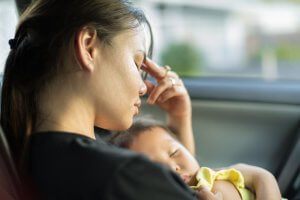Single Mothers and Addiction: What is the Relationship?
On the occasion of Mother’s Day, we start with at a statistic. About one in five children live with a solo mom. This information comes from a post by the Pew Research Center. It refers to children younger than 18 years of age and to a snapshot of life in the U.S. It’s a big number, this whopping 20 percent. And what makes it of interest to readers of the American Addiction Centers blog are the implications for substance use for members of these households.
What’s the connection between single mothers and addiction? The term “prevalent” is the best way to frame it. The Journal of the American Medical Association (JAMA) uses that descriptor to characterize the widespread nature of substance use disorders in this population. Why is that?
Vulnerability of Single Mothers to Addiction
Single mothers are more at risk than their counterparts. Factors include high stress levels in rearing children on their own and limited relief. They have no one with whom to share myriad responsibilities of running a household and raising a family. That includes the financial, emotional and domestic realms. The challenges can become overwhelming at times. On the economic end alone, Pew Research reports that “three in ten solo mothers are living in poverty.”
Other issues come into play. It’s possible that a segment of this group had been with a partner at some time who subjected them to domestic abuse. “Women who are victims of domestic violence are at increased risk of substance use.” That’s a finding of the National Institute on Drug Abuse (NIDA). So is another: “Divorce, loss of child custody, or the death of a partner or child can trigger women’s substance use or other mental health disorders.”
What is the lure of drugs and alcohol for these women? Some gravitate to substances to help manage the pressures on them as well as negative emotions, as noted in Substance Use in Women Research Report. Although they make start slowly, these users may fall into a pattern of dependency rapidly. NIDA informs: “Substance use in women tends to develop into addiction more quickly than in men.”
Addiction as a Family Matter
Addiction may not stop at the top of the chain. What starts with the mom may ripple through the family. There are many variables to consider. Some mothers may have abused substances before having children. Others may have continued using during their pregnancy and beyond. These behaviors put their children at risk. “Pregnant women using drugs, including tobacco and alcohol, can pass those drugs to their developing fetuses and cause them harm.” This comes from the research report referred to above. It goes on to note: “Similarly, new mothers using drugs can pass those to their babies through breast milk and cause them harm.”
The children may suffer the effects in many ways. The offspring of mothers with a substance use disorder are more likely than others to have problems academically and socially, states the Substance Abuse and Mental Health Services Administration (SAMHSA). Those are some of the indirect effects. There are others too, such as the ramifications of parental abuse and neglect.
Then there is the big one addressed in a CBS News brief on “Single-Parent Kids More at Risk.” It discusses a major study conducted in Sweden on single parent households; the results pertain to all such living arrangements, headed by either gender. The gist is that children who come from these single-led environments may go the route of substance use themselves. That applies to “alcohol problems, and the increased risk for drug addiction.”
Treatment Options for Substance Use Disorders
Of course, only a subset of single mothers becomes addicted to substances. The same goes for their children. However, understanding these possibilities is of value. It helps identify triggers, mitigate problems and obtain treatment. American Addiction Centers acknowledges that “one of the biggest challenges that single parent households face is access to treatment for a substance abuse problem.” There are programs that incorporate the needs of single parents as well as child care options.
If you or a loved one would benefit from the services of a trusted provider, start on the path to recovery by clicking here.
